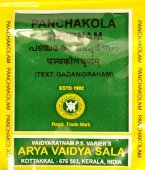Nakara, Nakāra, Nakarā, Nakārā: 14 definitions
Introduction:
Nakara means something in Hinduism, Sanskrit, the history of ancient India, Marathi, Jainism, Prakrit, Hindi, biology, Tamil. If you want to know the exact meaning, history, etymology or English translation of this term then check out the descriptions on this page. Add your comment or reference to a book if you want to contribute to this summary article.
Alternative spellings of this word include Nakar.
Images (photo gallery)
In Hinduism
Vyakarana (Sanskrit grammar)
Source: Wikisource: A dictionary of Sanskrit grammarNakāra (नकार).—The consonant न (na) to which the vowel अ (a) and the affix कार (kāra) are added for facility of utterance; e. g. तथा नकार उदये नकारे (tathā nakāra udaye nakāre) R. Pr. IV.; cf. V. Pr. I. 17, 21.

Vyakarana (व्याकरण, vyākaraṇa) refers to Sanskrit grammar and represents one of the six additional sciences (vedanga) to be studied along with the Vedas. Vyakarana concerns itself with the rules of Sanskrit grammar and linguistic analysis in order to establish the correct context of words and sentences.
India history and geography
Source: Cologne Digital Sanskrit Dictionaries: Indian Epigraphical GlossaryNakara.—Kannaḍa; same as Sanskrit nagara (q. v.); also spelt nakhara. Note: nakara is defined in the “Indian epigraphical glossary” as it can be found on ancient inscriptions commonly written in Sanskrit, Prakrit or Dravidian languages.

The history of India traces the identification of countries, villages, towns and other regions of India, as well as mythology, zoology, royal dynasties, rulers, tribes, local festivities and traditions and regional languages. Ancient India enjoyed religious freedom and encourages the path of Dharma, a concept common to Buddhism, Hinduism, and Jainism.
Biology (plants and animals)
Source: Google Books: CRC World Dictionary (Regional names)Nakara in India is the name of a plant defined with Elaeocarpus tuberculatus in various botanical sources. This page contains potential references in Ayurveda, modern medicine, and other folk traditions or local practices It has the synonym Monocera tuberculata (Roxb.) Wight & Arn..
Example references for further research on medicinal uses or toxicity (see latin names for full list):
· Cat. Ind. Pl. (1833)
· Hortus Bengalensis, or ‘a Catalogue of the Plants Growing in the Hounourable East India Company's Botanical Garden at Calcutta’ (1814)
· Flora Indica (1832)
· Prodr. Flora Indica, or ‘Descriptions of Indian Plants’ Orient. (1834)
If you are looking for specific details regarding Nakara, for example chemical composition, health benefits, pregnancy safety, diet and recipes, side effects, extract dosage, have a look at these references.

This sections includes definitions from the five kingdoms of living things: Animals, Plants, Fungi, Protists and Monera. It will include both the official binomial nomenclature (scientific names usually in Latin) as well as regional spellings and variants.
Languages of India and abroad
Marathi-English dictionary
Source: DDSA: The Molesworth Marathi and English Dictionarynakāra (नकार).—m (na & kāra Affix.) Denying or refusing: denial, refusal, rejection. v kara. 2 The rejection of a draft or bill; or the writing intimating it, written upon the face of it.
--- OR ---
nākāra (नाकार).—m nākāraṇī f Refusing through disapprobation; disallowing, declining, rejecting.
--- OR ---
nākārā (नाकारा).—a ( H) Bad, worthless, useless.
Source: DDSA: The Aryabhusan school dictionary, Marathi-Englishnakāra (नकार).—m Denying or refusing. The rejection of a draft or bill.
--- OR ---
nākāra (नाकार).—m nākāraṇī f Refusing through disapprobation; declining, rejecting.
--- OR ---
nākārā (नाकारा).—a Bad, worthless, useless.
Marathi is an Indo-European language having over 70 million native speakers people in (predominantly) Maharashtra India. Marathi, like many other Indo-Aryan languages, evolved from early forms of Prakrit, which itself is a subset of Sanskrit, one of the most ancient languages of the world.
Sanskrit dictionary
Source: Cologne Digital Sanskrit Dictionaries: Cappeller Sanskrit-English DictionaryNakāra (नकार).—[neuter] the sound n or the negation na.
Source: Cologne Digital Sanskrit Dictionaries: Monier-Williams Sanskrit-English Dictionary1) Ṅakāra (ङकार):—[=ṅa-kāra] [from ṅa] m. the letter or sound ṅa.
2) Ñakāra (ञकार):—[=ña-kāra] [from ña] m. the letter ñ.
3) Ṇakāra (णकार):—[=ṇa-kāra] [from ṇa] m. the letter or sound ṇ, [vii, 1; xiii, 6.]
4) Nakāra (नकार):—[=na-kāra] [from na] 1. na-kāra m. the sound or letter n [grammar]
5) [v.s. ...] (in prosody) a tribrach
6) [=na-kāra] [from na] 2.na-kāra m. the negation na, the word No, [Naiṣadha-carita]
Source: DDSA: Paia-sadda-mahannavo; a comprehensive Prakrit Hindi dictionary (S)Ṇakāra (णकार) in the Sanskrit language is related to the Prakrit words: Ṇakāra, Ṇagara.
[Sanskrit to German]
Sanskrit, also spelled संस्कृतम् (saṃskṛtam), is an ancient language of India commonly seen as the grandmother of the Indo-European language family (even English!). Closely allied with Prakrit and Pali, Sanskrit is more exhaustive in both grammar and terms and has the most extensive collection of literature in the world, greatly surpassing its sister-languages Greek and Latin.
Hindi dictionary
Source: DDSA: A practical Hindi-English dictionaryNakāra (नकार) [Also spelled nakar]:—(nm) the letter [na] (na) and its sound; (nm) decline; refusal; negation; denial; ~[rāṃta] (a word) ending in [n] (n).
...
Prakrit-English dictionary
Source: DDSA: Paia-sadda-mahannavo; a comprehensive Prakrit Hindi dictionaryṆakāra (णकार) in the Prakrit language is related to the Sanskrit words: Ṇakāra, Nakāra.
Prakrit is an ancient language closely associated with both Pali and Sanskrit. Jain literature is often composed in this language or sub-dialects, such as the Agamas and their commentaries which are written in Ardhamagadhi and Maharashtri Prakrit. The earliest extant texts can be dated to as early as the 4th century BCE although core portions might be older.
Kannada-English dictionary
Source: Alar: Kannada-English corpusṄakāra (ಙಕಾರ):—[noun] the nasal consonant ŋ.
--- OR ---
Ñakāra (ಞಕಾರ):—[noun] the nasal consonant 'ಞ [na] '.
--- OR ---
Ṇakāra (ಣಕಾರ):—[noun] the letter or the sound of 'ಣ'.
--- OR ---
Nakara (ನಕರ):—[noun] a union of men in the same craft, esp. trade, formed to protect the interest of its members.
--- OR ---
Nakara (ನಕರ):—[noun] a large kettle-drum.
--- OR ---
Nakāra (ನಕಾರ):—
1) [noun] the letter or the sound of 'ನ [na] '.
2) [noun] an utterance expressing refusal; an expression meaning 'no'.
--- OR ---
Nākara (ನಾಕರ):—[noun] = ನಾಂಗರು [namgaru].
Kannada is a Dravidian language (as opposed to the Indo-European language family) mainly spoken in the southwestern region of India.
Tamil dictionary
Source: DDSA: University of Madras: Tamil LexiconNakarā (நகரா) noun < Urdu naqārā. A large kettle-drum; பெருமுரசுவகை. நகரா முழங்க [perumurasuvagai. nagara muzhanga] (கொண்டல்விடு. [kondalvidu.] 508).
--- OR ---
Nakārā (நகாரா) noun < Urdu naqārā. Kettle-drum; நகரா. [nagara.]
Tamil is an ancient language of India from the Dravidian family spoken by roughly 250 million people mainly in southern India and Sri Lanka.
See also (Relevant definitions)
Starts with (+22): Nakara-pativalnar, Nakara-vavi, Nakaraca, Nakaracam, Nakaracan, Nakaragana, Nakaragumte, Nakarai, Nakaraiyan, Nakarakatam, Nakarakkal, Nakarakkoyil, Nakaram, Nakaramakkal, Nakarampalam, Nakarana, Nakaranam, Nakaranem, Nakarani, Nakarankalilar.
Ends with (+265): Abhinavavrittaratnakara, Acararatnakara, Ajnakara, Akaranakara, Akramanakara, Alamkararatnakara, Amkanakara, Anakara, Anjanakara, Annakara, Anveshanakara, Anyopadesharatnakara, Apaharanakara, Apamanakara, Arunakara, Asheshabharanakara, Asthisamdhanakara, Atikramanakara, Audgatraratnakara, Avacanakara.
Full-text (+502): Nagara, Nagararakshin, Nagaradhipa, Nagarastha, Nagarajana, Nagariya, Nakar, Nagaraghata, Girinagara, Nagarasvamin, Nagarapati, Nakaranem, Nagaraukas, Nagarapradakshina, Maha-nagara, Sakhanagara, Nagarakaka, Nagaropanta, Nakaravipula, Nagaradhipati.
Relevant text
Search found 75 books and stories containing Nakara, Na-kara, Ṅa-kāra, Ña-kāra, Ṇa-kāra, Na-kāra, Nagaaraa, Nagara, Nagaraa, Nakāra, Nākāra, Nākārā, Ṅakāra, Ñakāra, Ṇakāra, Nākara, Nakarā, Nakārā, Nkara, Ṅkāra, Ñkāra; (plurals include: Nakaras, karas, kāras, Nagaaraas, Nagaras, Nagaraas, Nakāras, Nākāras, Nākārās, Ṅakāras, Ñakāras, Ṇakāras, Nākaras, Nakarās, Nakārās, Nkaras, Ṅkāras, Ñkāras). You can also click to the full overview containing English textual excerpts. Below are direct links for the most relevant articles:
Chaitanya Bhagavata (by Bhumipati Dāsa)
Verse 1.14.6 < [Chapter 14 - The Lord’s Travel to East Bengal and the Disappearance of Lakṣmīpriyā]
Verse 3.1.7 < [Chapter 1 - Meeting Again at the House of Śrī Advaita Ācārya]
Verse 3.2.280 < [Chapter 2 - Description of the Lord’s Travel Through Bhuvaneśvara and Other Placesto Jagannātha Purī]
Vastu-shastra (2): Town Planning (by D. N. Shukla)
Towns or Cities in ancient Indian town-planning < [Chapter 2 - Villages, Towns and Forts in General]
Vastu-shastra (5): Temple Architecture (by D. N. Shukla)
Chapter 4 - Prāsāda styles (A): Nāgara
Chādya-prāsādas and Sabhā-maṇḍapas (Flat-roofed and Hall-temples) < [Chapter 12 - History of Hindu Temples (Prāsādas and Vimānas)]
Temples of Gujrat (Gujarat) and the West < [Chapter 12 - History of Hindu Temples (Prāsādas and Vimānas)]
Tiruvaymoli (Thiruvaimozhi): English translation (by S. Satyamurthi Ayyangar)
Pasuram 7.10.7 < [Section 10 - Tenth Tiruvaymoli (Inpam payakka)]
Pasuram 7.10.6 < [Section 10 - Tenth Tiruvaymoli (Inpam payakka)]
Kashyapa Shilpa-shastra (study) (by K. Vidyuta)
4.4. Māna (proportionate measurements) < [Chapter 1 - Introduction]
Rig Veda (translation and commentary) (by H. H. Wilson)
Rig Veda 10.95.9 < [Sukta 95]
Related products
(+30 more products available)







